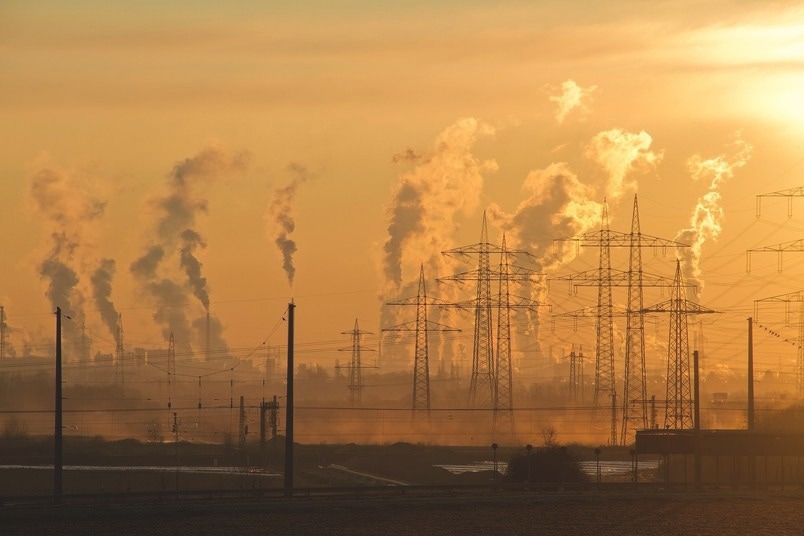As outlined by the Paris Climate Agreement, the growth of natural gas infrastructure endangers energy transition, as natural gas is not a bridge technology toward a 100% renewable energy system.
 Besides CO2, methane is a major problem with supposedly clean natural gas use. Image Credit: © Public Domain.
Besides CO2, methane is a major problem with supposedly clean natural gas use. Image Credit: © Public Domain.
The study performed by an interdisciplinary German research team was reported in the journal Nature Energy on July 4th, 2022.
The researchers looked at the natural gas issue from five different angles and gave gas a climate balance that was about as bad as coal or oil. They suggest that the current natural gas presumptions be updated by scientists and politicians.
The study was led by Professor Claudia Kemfert from the German Institute for Economic Research (DIW) and Leuphana University Lüneburg jointly with Franziska Hoffart from Ruhr-Universität Bochum, Fabian Präger from Technische Universität Berlin and Isabell Braunger and Hanna Brauers from the University of Flensburg.
Energy Crisis is Only One Facet of the Problem
The German government is faced with the challenge of reducing energy dependence on Russia while continuing to provide a cost-effective, secure, and climate-friendly energy supply in the wake of Russia's offensive war.
Currently, efforts are being made to establish new gas trade relations and new infrastructure in order to make up for the restricted and uncertain supply of natural gas coming from Russia.
Fossil natural gas is neither clean nor safe. By holding on to fossil natural gas for too long, Germany has found itself in an energy crisis. The country can now only emerge from this crisis by taking decisive action for consistent decarbonization towards a full supply from renewable energies.
Claudia Kemfert, Professor, German Institute for Economic Research, Leuphana University
Natural Gas Use is Not Per Se Preferable to Coal and Oil
The scientists question extensive assumptions regarding natural gas from five prospects. In the process performed, they concentrate on risks linked to the additional expansion of natural gas infrastructure and ongoing heavy use of natural gas.
While several people still tend to subscribe to the idea that natural gas seems to be clean, extensive research performed has shown that the climate impact of natural gas use is considerably undervalued and that the fossil fuel is by no means a better alternative to oil and coal use.
CO2 is not the only problem; there’s also the highly effective greenhouse gas methane, which escapes unburned into the atmosphere along the entire value chain through fugitive emissions. So far, these emissions have not been sufficiently taken into account and have so far been underestimated.
Fabian Präger, Technische Universität Berlin
The Narrative of Bridge Technology is Misleading
Furthermore, the scientists posit that an expansion of natural gas infrastructure can result in path dependencies (“lock-in effects”) and economic climate risks like the premature loss of value of fossil assets (“stranded assets”).
Investments in fossil energy infrastructure cement dependence on fossil fuels and emissions for decades. Huge economic costs and fossil path dependencies are thus created, delaying the phase-out of fossil energy and the development of a 100% renewable energy system. Infrastructure that is not compatible with climate goals is threatened with early decommissioning with economic losses.
Franziska Hoffart, Ruhr-Universität Bochum
Five Measures
The scientists suggest five measures to prevent such risks:
- Management of methane emissions across the natural gas value chain
- Revising the assumptions of scenario analyses depending on new research outcomes on greenhouse gas emissions linked to natural gas
- Substituting the bridge technology narrative with evident and crucial decarbonization criteria
- Preventing additional methane leaks and natural gas lock-ins
- Severe and strict consideration of climate-related risks in energy infrastructure planning
Isabell Braunger added, “We hope to use these findings to add a critical perspective to the academic and public discussion on the future of fossil natural gas and infrastructure.”
“The paper is not only aimed at the scientific community, but, more importantly, at governments developing strategies to mitigate greenhouse gases. After all, investments in natural gas infrastructure may hold back the energy transition and entail enormous economic risks,” pointed out Hanna Brauers.
Interdisciplinary Study Reveals Shortfalls of Current Discourse
One of the unique aspects of the study is the mixture of various perspectives that make a holistic view of the subject matter. The scientists were able to obtain this perspective as a result of their various backgrounds in industrial engineering, economics, ethics, and politics.
“This is how we show that the current discussion is incomplete and that a holistic and interdisciplinary research approach to the energy transition and social-ecological transformation processes provides deeper insights,” add the authors.
They conclude, “The climate and geopolitical energy crisis surrounding fossil fuels highlights the need for a timely and consistent natural gas exit, which must be organized and implemented by society as a whole.”
Journal Reference:
Kemfert, C., et al. (2022) The expansion of natural gas infrastructure puts energy transitions at risk. Nature Energy. doi.org/10.1038/s41560-022-01060-3.